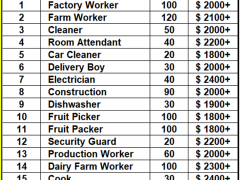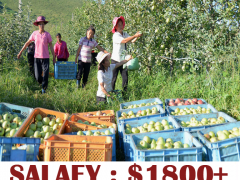Farm Worker Jobs in Canada With Visa Sponsorship
The Lure of Canadian Agriculture
Canada’s vast expanse of fertile land, combined with a favorable climate and advanced agricultural practices, makes it one of the top destinations for farming. But what really is the magnetism behind this?
Why Canada?
Canada’s attractiveness isn’t just in its soil and landscapes. It’s also about the nation’s commitment to sustainable farming, a strong economy, and a global reputation for producing quality agricultural products. When farm workers think of a stable, rewarding, and enriching environment for their profession, Canada frequently comes to mind. And who can resist the charm of working amidst the stunning backdrops of Canadian farmlands?
The Backbone of Canadian Farming
Behind every juicy apple, every grain of wheat, and every glass of Canadian milk, there’s an army of dedicated farm workers. These individuals, with their hands deep in the soil, are the real force driving Canada’s agricultural success. Their relentless work ensures that farms run efficiently and produce reaches markets, both local and international. Recognizing their importance, Canada has put forth programs and opportunities to ensure that they have the best conditions to work in, making the nation even more enticing for potential farm workers.
Types of Farm Worker Jobs
Canada’s diverse agricultural landscape offers a wide variety of farm worker jobs. Whether you’re someone who loves the feel of soil under your fingertips or someone who’s fascinated by the hum of machines, there’s a place for you in Canada’s farmlands. Let’s dive deeper into some of these roles.
Apply Also: Cook jobs in Toronto
Crop Cultivation
Imagine standing amidst vast fields of gold—wheat swaying with the breeze. In Canada, crop cultivation is a significant part of the agricultural sector. Farm workers in this category engage in tasks ranging from planting seeds and nurturing young plants to protecting them from pests and, finally, harvesting the mature crops. Different regions specialize in different crops—grains in the Prairies, fruits in British Columbia, or vegetables in Ontario. The diverse climate allows for a vast variety of crops, ensuring that there’s never a dull moment in this field.
Animal Husbandry
For those who have an affinity for animals, Canada offers ample opportunities. From dairy farms in Quebec to cattle ranches in Alberta, the scope is vast. Workers involved in animal husbandry are responsible for feeding, grooming, and taking care of the health of livestock. This includes cattle, poultry, pigs, and even bees for honey production! With the shift towards organic and humane farming practices, the role of farm workers in ensuring the well-being of these animals becomes even more critical.
Agricultural Equipment Operations
Modern farming isn’t just about manual labor. With the advent of technology, many farms now use advanced machinery to sow, irrigate, and harvest crops. As an agricultural equipment operator, you’d be in charge of driving and maintaining these machines. Think about it—instead of a traditional tractor, you could be operating GPS-guided machinery or drones that monitor crop health from above! This role requires a blend of tech-savviness and a basic understanding of farming practices. In Canada, where many farms are embracing technological advancements, this job profile is gaining significance.
Apply Also: LMIA Approved Jobs | Walmart Jobs in Calgary
How Visa Sponsorship Works
For many aspiring farm workers looking to find employment in Canada, the visa sponsorship program is a golden opportunity. But how does it work? The process, while straightforward, requires understanding some basic requirements and following the application procedure diligently. Let’s dive into the details.
Basic Requirements
Before you can dream of the Canadian farmlands, there are a few boxes you need to tick. At its core, these are the basic prerequisites for most visa sponsorship programs:
- Job Offer: Typically, you’d need a valid job offer from a Canadian employer. This offer demonstrates that there’s a genuine need for your expertise in Canada.
- Relevant Experience: Having some experience in the farming sector can significantly bolster your chances. Canada values skilled workers, and your experience showcases your capability.
- Health and Security: Canada ensures the well-being of its residents. As such, potential visa candidates might need to undergo health examinations and security checks to ensure they don’t pose a risk.
Application Process
While the idea of navigating the visa process can sound daunting, it’s a systematic journey:
- Document Collection: Start by gathering all necessary documents. This includes your job offer, proof of relevant experience, identification documents, and any other paperwork specified by the Canadian immigration authorities.
- Application Submission: Once all documents are ready, you’ll submit your application for the visa sponsorship program. This often involves filling out specific forms detailing your personal and professional background.
- Wait and Respond: After submission, there’s a waiting period. During this time, immigration officials review applications. They might reach out for additional information or clarifications, so it’s crucial to be responsive.
- Decision: Once your application has been thoroughly reviewed, you’ll receive a decision. If approved, congrats! You’re on your way to starting your farming journey in Canada. If not, don’t be disheartened—often, feedback is provided, and you can reapply considering that input.
Living and Working in Canada
Moving to Canada for work is not just about the job. It’s a holistic experience that encompasses adapting to a new culture, understanding the workplace ethos, and integrating oneself into the Canadian way of life. Canada, with its diverse population and rich cultural tapestry, offers a unique and enriching experience for farm workers from all over the world.
Cultural Adjustments
So, you’ve landed in Canada, and everything feels…different? That’s the beauty of immersing oneself in a new culture! Here’s what you might encounter:
- Diverse Communities: Canada is a melting pot of cultures. This means that while there might be unfamiliar customs, there’s also a high chance of finding a slice of home, no matter where you’re from.
- Language Nuances: While English and French are the official languages, you’ll find a plethora of accents and regional slang. Over time, “eh?” might just find its way into your vocabulary!
- Weather Wonders: If you’re from a tropical country, Canadian winters can be a surprise! But there’s something magical about the first snowfall. Plus, Canadians are experts at staying cozy.
- Politeness: Canadians are often noted for their politeness. Don’t be surprised if you’re thanked for the smallest gestures—it’s just the Canadian way!
Benefits and Compensation
Working in Canada is not just about the paycheck, although that’s certainly a perk! Here’s what farm workers can expect:
- Competitive Pay: Canadian employers often offer competitive salaries to farm workers, recognizing the value they bring to the table.
- Additional Benefits: Depending on the employer, you might receive benefits like health insurance, paid leave, or even accommodation.
- Safety and Rights: Canada has stringent labor laws that ensure the safety and rights of workers are protected. This includes everything from safe working conditions to fair work hours.
- Opportunities for Growth: The agricultural sector in Canada is vast and varied. This means that there’s ample room for career advancement and skill development.
In essence, living and working in Canada offers a blend of professional satisfaction and personal growth. With its welcoming communities and robust work ethos, it’s a destination many farm workers cherish.
Getting Prepared for the Job
Embarking on a farm worker job in Canada is thrilling, but it’s essential to be well-prepared to maximize your efficiency and safety. Preparations often encompass gaining the right training and familiarizing oneself with the vital tools of the trade. Let’s take a closer look.
Necessary Training
Before diving into the fields, it’s crucial to arm oneself with the right knowledge:
- Skill Development Programs: Many employers offer on-the-job training sessions, especially if you’re venturing into a specialized area of farming.
- Local Workshops: Consider attending local agricultural workshops or short courses that focus on Canadian farming practices.
- Certifications: Depending on the job role, obtaining specific certifications—like pesticide application or machinery operation—might boost your employability and skill set.
Essential Tools and Equipment
Being equipped with the right tools can make tasks more manageable and more efficient:
- Hand Tools: From hoes, spades, and rakes to pruning shears and sickles, hand tools are every farm worker’s best friends.
- Machinery: If your job involves operating machinery, familiarize yourself with their usage, maintenance, and safety protocols. This might include tractors, harvesters, or even smaller tools like power tillers.
- Protective Gear: Depending on the nature of your job, gear like gloves, protective eyewear, and boots might be essential.
Safety Precautions
Safety can’t be emphasized enough when it comes to farming:
- Understand the Equipment: Before operating any machinery, ensure you’re trained and understand all safety guidelines.
- Chemical Safety: If your role involves handling pesticides or fertilizers, always wear protective gear and follow recommended application guidelines.
- Be Aware of Surroundings: Farms can be bustling places with moving machinery, animals, and other workers. Always be aware of your surroundings to prevent accidents.
- Emergency Protocols: Familiarize yourself with the farm’s emergency procedures—knowing what to do in case of fires, chemical spills, or injuries can make all the difference.
Conclusion Farm Worker Jobs in Canada With Visa Sponsorship
Canada’s farming landscape is vast, diverse, and brimming with opportunities. For farm workers worldwide, it offers a unique blend of professional growth, competitive compensation, and a chance to be a part of a globally recognized agricultural sector. From the rolling grain fields of the Prairies to the vineyards of British Columbia, there’s a place for every aspiring farm worker.
But more than just the work, Canada offers a life experience. It’s a chance to immerse oneself in a rich cultural tapestry, to experience the warm summers and snow-clad winters, and to be a part of a community that values hard work, innovation, and mutual respect.
For those considering making the move, it’s essential to be well-prepared—understand the visa sponsorship process, familiarize oneself with the Canadian farming practices, and always prioritize safety. With the right approach and mindset, the Canadian farming dream is not just achievable—it’s rewarding.
Whether you’re a seasoned farm worker or someone just starting in the field, Canada’s doors are open, and its farms are waiting. Ready to sow the seeds of your Canadian dream?
FAQs Farm Worker Jobs in Canada With Visa Sponsorship
- Is farming a significant sector in Canada?
Yes, farming is a cornerstone of the Canadian economy, with the country being a top producer of various crops and livestock. - Do I need prior experience to work on a Canadian farm?
While experience can be beneficial and enhance your job prospects, many employers offer training to newcomers, especially in specialized areas. - How cold do Canadian winters get? Is it possible to farm year-round?
Canadian winters can be chilly, especially in the northern regions. However, farming practices adjust to the seasons, with certain crops grown in the warmer months and others cultivated in controlled environments during colder months. - Is it easy to adapt to Canadian culture?
Canada is a multicultural country with people from various backgrounds. This diversity makes it a welcoming place for newcomers, though, like any new environment, there might be an initial adjustment period. - Are there growth opportunities for farm workers in Canada?
Absolutely! The Canadian agricultural sector is vast, and there are always opportunities for skill development, specialization, and career advancement.
Farm Worker Jobs in Canada With Visa Sponsorship
Latest LIMA Approved Jobs in Canada
| Position | Apply Link |
| Factory Worker | Click Here |
| Supermarket Jobs | Click Here |
| Farm worker | Click Here |
| Driver | Click Here |
| Cook | Click Here |
| Production Worker | Click Here |
| Housekeeper | Click Here |
| Truck Driver | Click Here |
| Entry Level Jobs | Click Here |














